For Nick Foles and the Eagles, It’s All Feeling Very Familiar
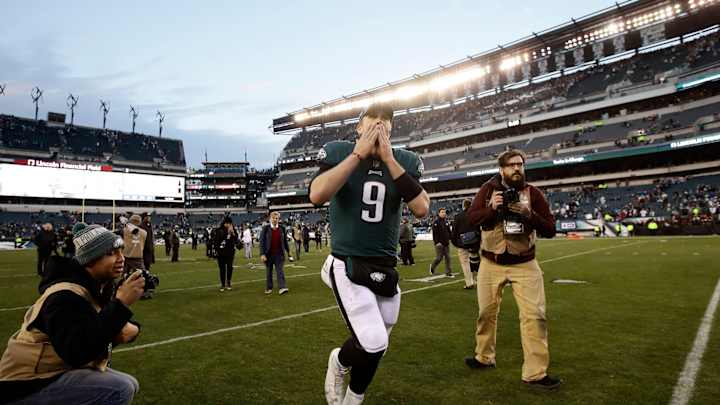
There’s still some late-afternoon daylight left when Nick Foles jogs onto the field at the Los Angeles Memorial Coliseum on Dec. 16. The bass of the warmup soundtrack thumps from the end zone. The Eagles’ quarterback lofts passes up the right sideline, then the left. Half an hour before kickoff the team huddles together, with Foles in the middle. For Philadelphia, at 6-7, the sun is going down—on both the afternoon and the promise of the 2018 season.
Imagine what Foles is thinking right now. Maybe he’s looking back to the years he spent cast aside, labeled a career backup. Or back to when he decided to retire . . . only to change his mind. Or to the Super Bowl run last season, the MVP honors he earned in that game and the whirlwind offseason. Or maybe to something darker, his return to the reality of the bench in 2018.
Here he is, on the same field where everything changed for him almost exactly one year ago, after another injury to starter Carson Wentz. Again a season hangs in the balance, more perilously even than before. It has to feel similar. And yet, aside from the stadium, almost nothing is the same.
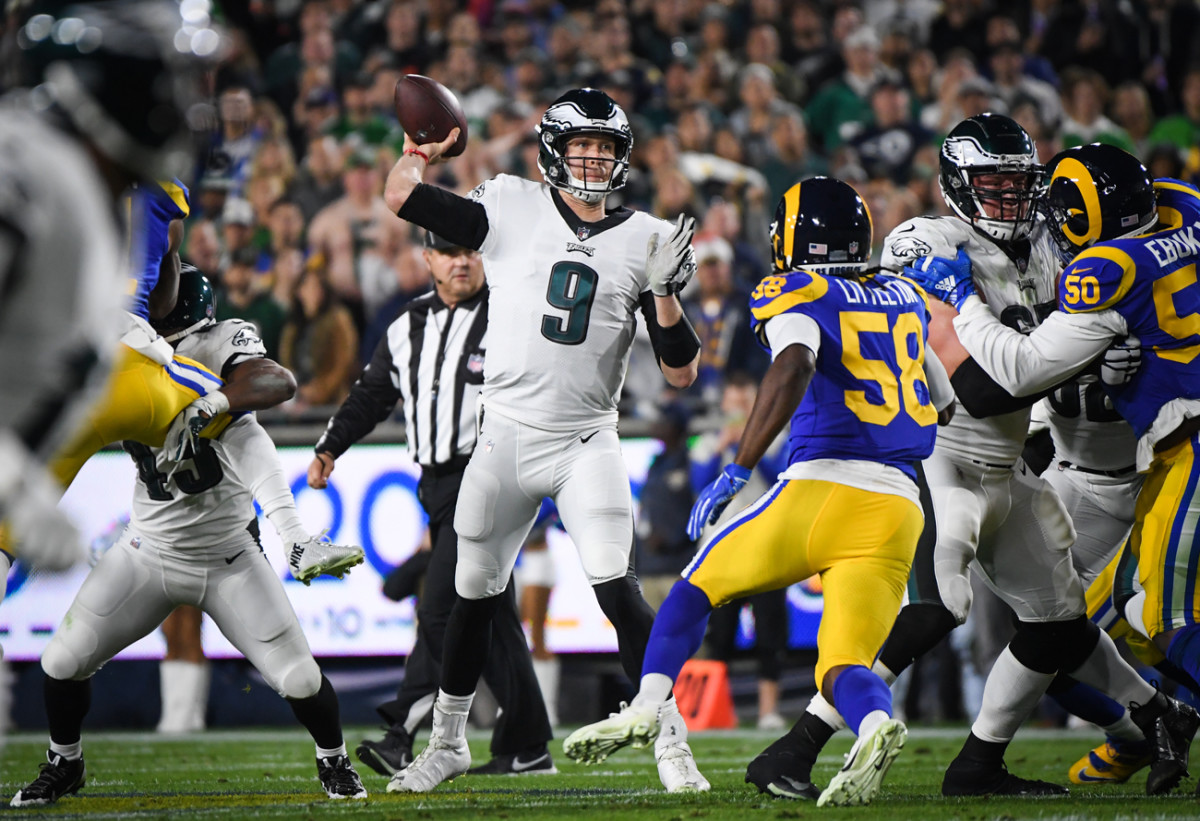
In December 2017, Week 14, Foles roamed these same Coliseum sidelines during warmups, not expecting to play. The Eagles were 10-2, sitting atop the NFC, led by an MVP frontrunner at quarterback. Then, with four minutes remaining in a one-possession game and Philly nearing L.A.’s goal line, Wentz scrambled and dived toward the end zone. His left leg was smashed and twisted by Rams defenders converging from both sides, and he came up limping.
Foles initially thought Wentz had the wind knocked out of him. But then the starter approached his backup on the sideline. “Hey, Nick,” Wentz said. “Get ready. Something feels a little weird.” Moments later, Eagles general manager Howie Roseman took a call from the training staff. They strongly believed Wentz had torn his ACL.
After rallying the Eagles to a 43-35 win, Foles ran into Roseman in the locker room. This, the GM told him, is why we brought you here.
And still, despite that show of confidence, an overwhelming sense of impending doom lingered in the aftermath—not just with the team’s tortured fan-base, which felt its championship aspirations had slipped away again; or in Vegas, where the Eagles became postseason underdogs; but also within the organization itself.
Foles, of course, had other plans, including the most improbable of championship runs. Behind the journeyman QB, the Eagles narrowly edged the Falcons, smashed the Vikings and triumphed over the heavily favored Patriots in Super Bowl LII. Foles became the unlikeliest of heroes, the ultimate underdog, a legend now referred to in Philadelphia almost exclusively by his new nickname: Big D--- Nick.
Twelve months later, everything is different. The 2018 Eagles are no juggernaut. They enter this pivotal December game in L.A. with a 14% chance of making the playoffs, according to FiveThirtyEight. The offense has looked inconsistent all year, starting with Wentz, whose season ended with a back injury days before the Rams game.
NFL PLAYOFF PREDICTIONS:The MMQB staff forecasts the postseason—and who will win Super Bowl LIII
The Eagles held no special meeting when Foles took over; there was no rousing speech, no rehashing of last year’s heroics. There didn’t have to be. This time there was no sense of impending doom. For possibly the first time in NFL history, a backup quarterback replaced an MVP-level starter and begat . . . increased optimism. This was not the end. It was a new beginning.
Foles had a straightforward conversation with his father that week, after learning he was taking over. “You’ve been there and done that,” Larry Foles told his son.
“You’re right, Dad,” Nick responded. “I’m ready.”
And he was. Foles threw for 270 yards as the Eagles held on for a 30-23 win over the Rams, keeping their playoff hopes alive, if not on life support. In victory the QB triggered a $500,000 bonus, a new wrinkle in the contract that Roseman had restructured back in April after choosing to keep Foles rather than trade him to a team that surely would have plugged him in as a starter. The deal made him the highest-paid backup in the league, an expensive but necessary contingency plan that highlights the premium the Eagles place on passers. They paid Foles almost like a starter because they expect him to perform like one.
After he did just that against the Rams, his teammates were forced into a cramped hallway to conduct interviews. There wasn’t enough room for all the activity—equipment workers hauled gear onto moving trucks, players spilled out into the night searching for loved ones, black-jacketed security guards patrolled it all as carts attached to other carts whizzed by. It was a chaotic mess, not dissimilar to the Eagles’ season before Foles stepped in.
One after another, players expressed a similar sentiment: Foles long ago ceased surprising them. Safety Malcolm Jenkins said this is what he expected, nothing less. Defensive tackle Fletcher Cox made it clear, no one on the team doubted the QB that week. Tackle Lane Johnson pointed out that whenever Foles is called upon, whenever he gets a chance, “he shows what he can do.”
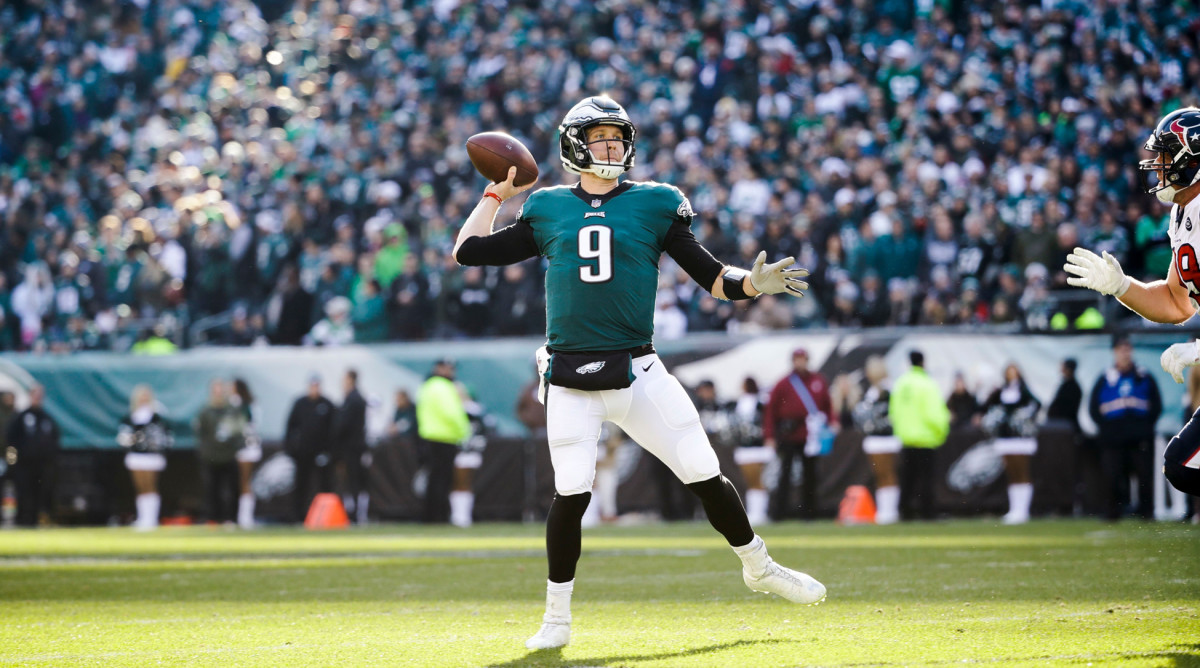
“You saw it this week, the importance of having more than one starting-caliber QB in this league,” said defensive end Michael Bennett. “And that dude can play.”
On the press-conference dais, Foles stood tall. In dark jeans and a plaid shirt—post-game Dad, straight out of central casting—he looked comfortable, at ease. There might even have been a slight puffing of the chest. He said he understood there would be comparisons to last season. But this is a new year, a new team, a new situation.
Not that he’s worried.
“I really thrive in staying in the moment,” he said. “We’ll see what happens.”
Nick Foles was lounging on the golden sand beaches of Oahu’s North Shore, looking out at an endless horizon. This was early in July 2018, two years and 2,500-odd miles removed from the fly-fishing trip he took to the Sierra Nevada Mountains after deciding, briefly, to retire from professional football. And five months after he was named MVP of Super Bowl LII.
Finally Foles had found a brief respite, and so he rented an oceanfront beach house that could fit eight adults and six children for a week. The whole family flew out to celebrate his mother-in-law’s 60th birthday. Foles threw the football around in a backyard that led right up to the Pacific; he waged war in water balloon fights and dived all over the grass in heated games of Spikeball. At night he ate scallops and lobster tail, seared mahi-mahi and ahi tuna on the grill.
KLEMKO:How Eric Weddle is driving the Ravens’ dominant defense
Yes, there was some reflecting that week—on the unprecedented path traveled and on the ultimate triumph earned—but those were conversations the rest of the family members had amongst themselves. Not Nick. He never talks football at home. He keeps the two halves of his life completely separate. Larry Foles says he hasn’t discussed the Super Bowl with his son even once since last February. Occasionally in Hawaii someone would ask, “Can you believe where you are now compared to two years ago?” Nick would only laugh.
That vacation marked Foles’s only break in a chaotic offseason. One day after the Super Bowl in Minneapolis he did an 8 a.m. press conference, then immediately flew to Disney World. The following months were packed with the promos and appearances required of a Super Bowl MVP, then a book tour for the autobiography Foles published in June. Before he knew it, another season was underway.
Foles entered the year in a rare position: unquestioned starter. But he knew the designation was impermanent. Wentz was close to a full recovery, and there was no debate about what would happen when the No. 2 draft pick from 2016 was fit—at least, not within the walls of team headquarters. Instead, with one year remaining on a two-year, $11 million contract, Foles spent most of the offseason hearing chatter about potential trades. And for two months he wondered where he would play in 2018—right up until Roseman reworked his deal. Of course he wanted to be a starter, his family says. A real starter, not a placeholder. But Foles knew he had no agency in the decision. And he doesn’t worry about things outside of his control.
On the field he led the Eagles to a season-opening win over the Falcons, but he was inconsistent, not near the level of that postseason run. The following week, in Tampa, where temperatures hovered near 100, he was much improved, passing for 334 yards, but Philadelphia narrowly lost.
That early part of the season, according to family members, was difficult for Foles, knowing the transience of his time as the starter. Not that the quarterback would ever say so, even in private. But he always knew the end was coming, no matter how well he played. In Week 3, Wentz tapped in, and Foles slid back to the bench without complaint—no Wait a minute, no I earned this. In some ways, when he rejoined the Eagles’ scout team, where for 12 weeks he wasn’t written or talked about much, it marked a return to normalcy.
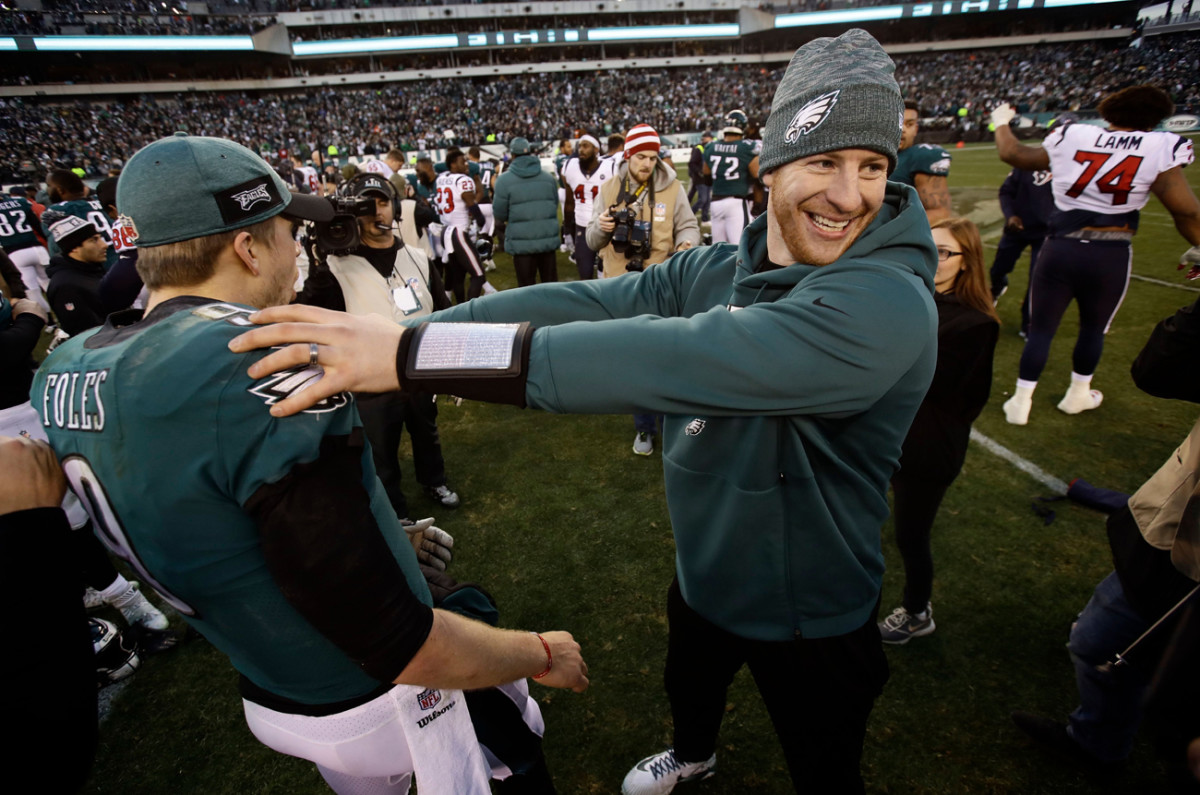
Normalcy meant, too, that as the backup he was again in charge of making Bulletproof coffee for the quarterbacks room. Every morning at 6 a.m., Foles, Wentz and third-stringer Nate Sudfeld would retreat to their small oasis—a converted closet decorated with wallpaper of mountains on one side and oceans on the other, white Christmas lights hanging year-round—to watch film. All agree that Foles makes the best brew, a recipe containing grass-fed butter, MCT oil and collagen protein.
Foles also reclaimed the inglorious role of leading the scout team in practices, and teammates report that nothing about the quarterback changed—not his attitude or his work habits. Second-teamers felt strange playing alongside someone so accomplished, but they say Foles retained an eerie calm every time he took the field. Here, as always, he kept quiet about last season. No bragging or reminiscing—not even when those wide-eyed backups wanted him to.
“They built a statue of him,” says defensive end Chris Long, referring to a bronze sculpture unveiled in September at Lincoln Financial Field, “and he hasn’t changed a bit.”
ORR:From Philly Special to 54-51—The Year NFL Offenses Went Crazy
Foles’s father knows that a return to the bench was difficult for his son. But not once did he hear Nick complain. The family believes that Foles’s flirtation with retirement two years ago, and that subsequent fly-fishing excursion, gave him clarity in his life and in his career. He figured out what drove him—and once he knew that, he finally seemed at peace. Foles knows what’s important—his faith, his family—says his brother-in-law, Ryan Moore, and he’s eliminated everything else that is not. Like worrying about whether he’d ever play again for the Eagles.
“He knew his time would come,” Larry says. “Whenever that might be.”
One defining characteristic of Howie Roseman’s tenure as Philadelphia’s general manager: his love of quarterbacks. And not just star quarterbacks, or even starting ones, but all signal callers, from project players to highly-paid backups who win Super Bowl MVP awards. In his nearly two decades with the Eagles, Roseman has looked anywhere and everywhere to fortify the position.
This particular doctrine in his philosophy dates back to the 2002 season, Roseman’s second year in Philly, when the Eagles earned the No. 1 playoff seed in the NFC despite quarterback Donovan McNabb fracturing his right fibula in Week 11. Shortly after McNabb went down, Roseman, a salary cap specialist at the time, ran into coach Andy Reid. “We are going to be just fine,” Reid said, issuing a vote of confidence in backup Koy Detmer. Then, the following week in San Francisco, Detmer dislocated his left elbow. When A.J. Feely took over and led the Eagles to four wins in their final five games, paving a path to the NFC Championship Game, Roseman realized the value in securing depth at the position.
Later, McNabb was knocked out of the 2003 NFC Championship Game; in ’05, he had a sports hernia and played only nine games; in ’06, he tore his right ACL, and backup Jeff Garcia led the team to a wild-card round victory. . . . On and on it went, and it all led Roseman to sign Foles in ’17—a move that saved his skin not once but twice. The position “is too important,” the GM says. “We’ve seen seasons hinge on second-quarterback play. It only becomes an issue when you need one.”
JONES:Jaylon Smith and Leighton Vander Esch: How the Cowboys’ young linebacking duo became the NFL’s best
Of course, not all backup QBs are built the same. Some are simply made for the big moment. Jeff Hostetler knows that as well as anyone. The Giants took him in the third round of the 1984 draft, and seven years later he’d started only two games when Phil Simms broke his right foot in Week 15. Enter Hostetler, who only a week earlier had sat down for dinner with his wife and decided he’d retire. “Six weeks later,” he says now, “I’m winning a Super Bowl.”
Sound familiar? After Wentz’s injury last season Hostetler received phone call after phone call from fans asking the same question: Do the Foles-led Eagles have a chance?
Of course they do, Hostetler would respond. Let’s see what Foles can do. There were so many similarities between what he and Philly’s QB went through: Hostetler was 29, Foles 28; both played behind fan-favorite QBs on league-leading teams; both contemplated quitting the game right before being thrust into the spotlight. It was, Hostetler says, “the closest situation to what I had gone through.”
And when Hoss took over? Sure, there was doubt, he says. The toughest thing about being a backup is maintaining confidence when you’re not playing, he notes. But “the sign of a guy that can handle it is [that he can] put away that doubt, put away the fear of failure. You have to be able to control it.”
Back in Los Angeles, in December, Foles told NBC’s Michelle Tafoya that after Wentz was ruled out this year he immediately thought back to 2017 and the emotions that came with that special run. He said he had to “fight the human side of it” and focus not on the clock or the scoreboard or past memories, but only on what he could control. Sound familiar?
Ryan Holiday watched that game and recognized a kindred spirit. The author-lecturer-guru has inspired athletes and entrepreneurs with books and speeches about Stoicism, an ancient Greek and Roman philosophy built around detachment from the sharp vicissitudes of life. And in Foles he saw someone who uses the Stoic mindset to manage one of the more volatile situations an elite athlete can confront. Starter or backup, Foles remains unchanged because he doesn’t allow external events to influence him. That, Holiday says, is Stoicism. “It’s not that you don’t care—it’s that you care so much you want to push out everything extraneous.
“The idea of being a role player,” he says, “is sort of an epithet in football. You want to be a star, not a role player. But Nick Foles is the ultimate role player, in front of 100 million people or on the practice squad.”
Four days after that season-saving win in L.A., Chris Long showed off a shrine he erected to the backup-quarterback-cum-savior-once-again: six white votive candles; five tall prayer candles, each adorned with a photo of Jesus; a signed copy of Foles’s book; and a photo of the QB from his journeyman days with the Rams. The defensive end called this mini altar a “sacred place” and said of his new god: “He’s been there to bail us out before. I know he’s going to show up big.”
Whatever works. But also: This was the belief permeating the locker room in mid-December, after Foles had won only one game. For a team that still needed two more wins—and help from a few other teams—to secure a miraculous playoff bid, there was an overwhelming sense of confidence that they would do just that. Players couldn’t quite explain this conviction, but they could all feel it, that Nick Foles energy.
Asked whether his QB lacks a certain, well, swagger, Long says that “swag comes in a lot of different forms.” For Foles, it’s more of an understated confidence that he imbues to everyone around him.
“A huge calm comes over his body,” explains Larry Foles, who says this goes all the way back to high school. “When it’s his time, it’s his time.”
A week after L.A. the Eagles needed a victory over the surging Texans, winners of 10 out of their last 11, to keep any playoffs hopes alive. Foles threw for a franchise-record 471 yards and four touchdowns, got smashed in the chest by Jadeveon Clowney and exited the game with a rib injury—only to come back, with the home crowd chanting his name, and complete two third-down passes while leading the offense on a game-winning, 72-yard drive in the waning seconds. Foles ran off the field blowing kisses to the crowd.
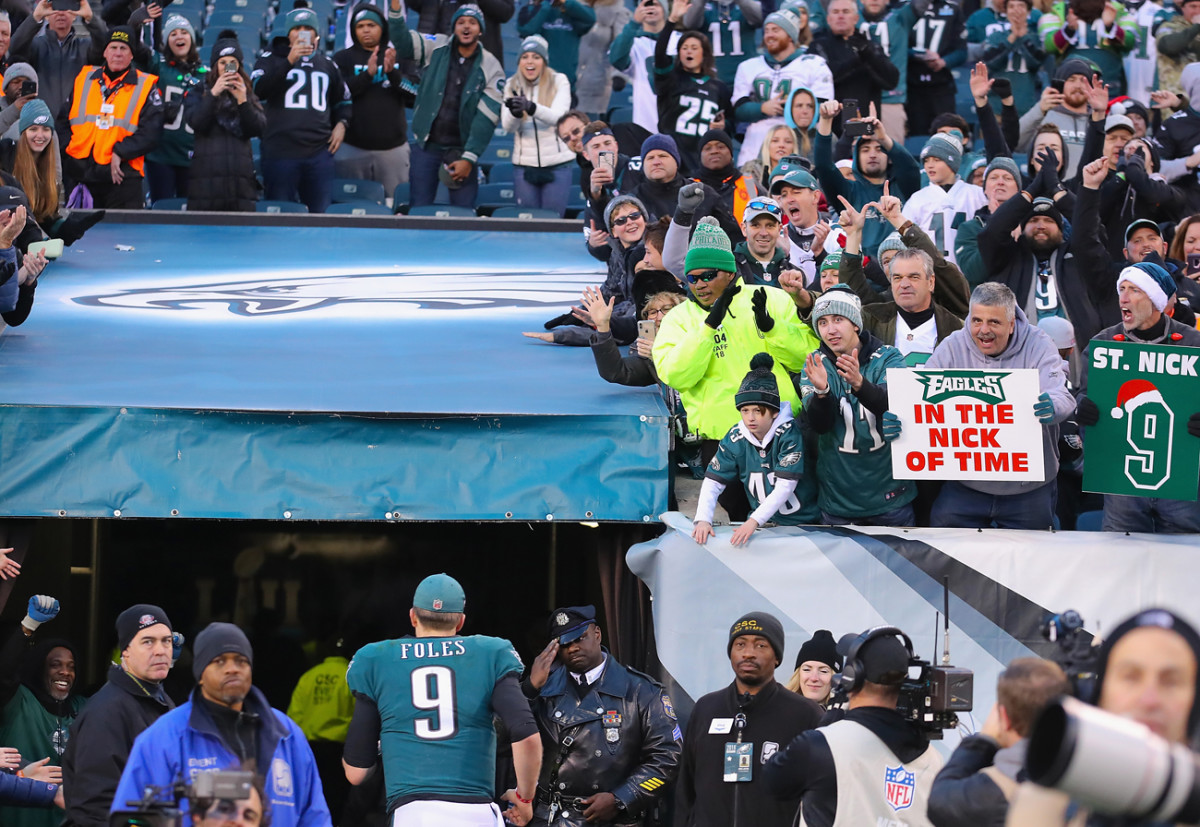
Week 17, against the Redskins, required perhaps a bit less magic, but it was no less marvelous: At one point Foles completed 25 straight passes, tying an NFL record, in a 24-0 win that, combined with a Vikings loss, completed an inevitable and wildly improbably reality. Afterward, playoff-bound Eagles fans waited in the away parking lot for the QB, doing the Vikings’ Skol clap while chanting Foles’s name. He’d done it again.
Foles leads the Eagles into Chicago Sunday for the wild-card round with a 9-1 record in prime-time or playoff games since his rookie year. In four postseason starts he’s completed 71.9% of his passes and thrown for 1,177 yards, eight TDs and one interception, with a sparkling 113.2 passer rating. (That rating jumps to 130.4 if you look only at his second-half performances.) Across history he either owns or has tied the NFL record for a) most consecutive completions and b) touchdowns in a single game; he also has the c) highest completion percentage in a single postseason; d) highest all-time postseason passer rating; and e) highest completion percentage in a postseason. Already, two of his jerseys are on display in the Pro Football Hall of Fame. Perhaps it’s time to call Foles what he really is: the Eagles’ second starter.
ORR:Nick Foles and the Eagles—after this season, what’s next?
This notion is a bit new. After that Super Bowl LII win last February, there remained some debate over whether Foles had just gotten lucky. Maybe those three playoff wins were just a fluke. After this season’s run, though, that argument is getting considerably more difficult to make.
However this season ends, Foles will almost certainly become a free agent—likely the most sought-after quarterback on the market. He will be paid handsomely and become some team’s unquestioned starter, adding to his obligations and taking barista off his résumé, everything changing once again.
Question or comment? Email us at talkback@themmqb.com.
